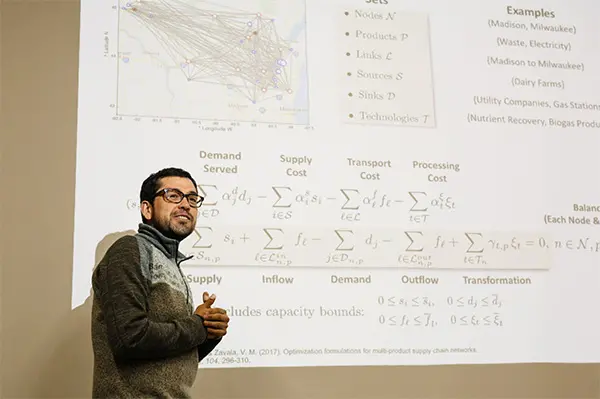The latest video game from the University of Wisconsin-Madison’s Field Day Lab and Victor Zavala, the Baldovin-DaPra Professor in chemical and biological engineering, teaches high school students how to harness systems engineering and attempt to navigate one of the biggest environmental challenges facing the United States right now — and it all has to do with cow poop.
The game, “Bloom: The Saga of the Poop Fertilizer Economy,” is a partnership between the award-winning Field Day Lab, which is based in the School of Education’s Wisconsin Center for Education Research, and Zavala. The web-based game puts players in charge of managing and balancing the agricultural, environmental and economic health of several communities. Phosphorus runoff, spurred by dairy cows’ manure and abundant crop fertilizer, leads to algae blooms that threaten water quality across the communities — and the solutions aren’t as simple as they may seem.
Zavala, who previously partnered with Field Day on the 2019 game “Lakeland,” says the goal of Bloom is to help players understand the complex interconnectivity of many contemporary environmental challenges.
“The key message that is driving this game is that when we make societal decisions, we need systems thinking,” Zavala says. “You need to think about how everything connects, like the economy, the environment, the government, and the people.”
 Victor Zavala presents some of his research on systems thinking and environmental issues during a Bloom design session with teachers and Field Day staff. Image courtesy Field Day Lab and Lovely Ember Photography.
Victor Zavala presents some of his research on systems thinking and environmental issues during a Bloom design session with teachers and Field Day staff. Image courtesy Field Day Lab and Lovely Ember Photography.
While “Lakeland” puts players into farmers’ shoes, “Bloom” gives them broader power and influence as policymakers. Modeled on the simulations engineers use to understand systems, the game lets players see how decisions about sales tax, environmental penalties and roadbuilding build upon, influence and inhibit each other.
Zavala says Field Day’s unique approach to conveying complex issues and creating engagement was a perfect fit for connecting his complicated research about phosphorus runoff to a general audience.
“By working with the Field Day Lab, it has become obvious to me that video games are a great way to communicate the research we are doing,” Zavala says. “The design of video games is all about connecting stories and concepts, connecting the dots on topics that players might not think are connected.”
Zavala’s work for and on the project was funded by a grant from the Environmental Protection Agency.
Amelia Moser, a game designer at Field Day and lead designer on “Bloom,” says the game is a sophisticated depiction of real-world dynamics.
“’Bloom’ is all about wrangling this complex system in a way that can help both farmers and the environment,” Moser says. “We designed from the core of the real-world system, so the game can give you an intuition for how slippery this problem is, and how we can actually address it.”
Sarah Gagnon, creative director at Field Day Lab, says the passion and expertise Zavala brings to their collaborations is a dream scenario for Field Day, which hopes to work with faculty across UW–Madison to translate their research into engaging educational experiences.
“A researcher with a vision for doing public research is powerful,” she says. “Victor is the kind of person we want to work with, that’s a perfect fit for us.”
Other recent Field Day games have tackled issues as diverse as journalism ethics and oceanic exploration.
For his part, Zavala says working with Field Day has transformed how he thinks about scientific communication.
“What I have learned from them is how to distill complexity, how to communicate in a way that doesn’t feel threatening, that is exciting and that is engaging,” he says.
He also notes the ability of video games to reach broad audiences. A typical Field Day game is played by 100,000 students a year in classrooms all around the world — including the Wisconsin classrooms where they are designed, developed, and piloted. The games also allow researchers to gather data on how players understand issues, solve problems and adapt their approaches.
Zavala says he already has an idea for another collaboration with Field Day. He’s become a true believer in the power of educational video games to teach, deepen understanding, and inspire change, and wants to keep his engagement with the medium going strong.
“Video games are a super scalable approach for outreach,” he says. “The sky’s the limit in terms of audiences that you will reach.”
Bloom is available today on the Field Day Lab website and will soon be available on educational game site BrainPOP and PBS Learning Media.
A previous version of this news release was published by the UW-Madison School of Education.